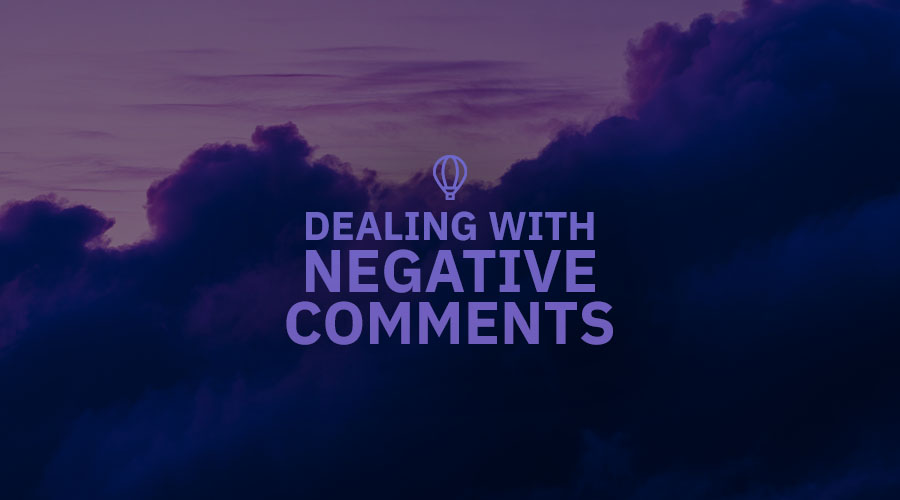We all get critical reactions from time to time, and your brand is certainly not excluded. As with any experience in life, it's not the bad comments you receive that matter - it's how you use them to your advantage and turn them into something productive and beautiful.
In this guide, we'll show you how to combat bad reviews on your social media page.
1. Acknowledging the feedback

First, you must respond to every comment on social media. Responding shows that your page is engaging and you're trying to connect with your audience, which can have a positive effect on your brand.
When somebody mentions your brand or product, it means they're interested in what you have to say. The idea is to acknowledge the comment, then focus on the friendly remarks and try to learn from the bad ones.
If you want a successful brand page, you need to make sure that people will engage with it. It doesn't matter if the engagement is good or bad, as long as it happens.
I bet you’ve downloaded an app that had critical reviews on the Play Store, which shows that these reviews aren't as bad as they look.
Still, some people tend to believe all the reviews they read. This is risky as an excellent review can help your brand but a critical review can hurt it dramatically.
The most important thing, though, is how you respond to them, so always be ready to manage them accordingly.
2. Accepting controversy
Some people are afraid of generating controversy, but it's admirable how there is nothing worth doing that doesn't generate some form of controversy.
Don't let any negativity keep you from being the voice of change. Because today's world operates largely in networks, you're better off embracing controversy than staying shy. It only takes one comment to get people talking, so it's unlikely that you'll go unnoticed if you put yourself out there boldly.
Wrestling heels still get a ton of attention and relevant interaction on social media posts. Visit their profiles and see plenty of fan engagement for this kind of content despite them sometimes playing the bad guy and the supposed villain in the sport.
That's the way of the world we live in today. There will always be negative comments; don't let them discourage you to start something controversial, take it as a challenge to improve.
3. Paying close attention

Negative reviews can be bad for your revenues. To become more successful, it's important to address these issues head-on.
The biggest mistake you'll ever make is to ignore criticism, because the helpful comments are just as important. Pay careful attention to both negative and positive feedback.
It is very important to read every review you get. Every comment matters and can play a big part in your brand's growth - just be mindful of your response to each comment if you want to see improvement.
Most negative comments are an indicator of what needs fixing, so take time to learn from them. Ignoring bad comments can be a costly mistake as it leads to you losing clients and being less productive.
Most complaints are customers' frustrations with your product. Being aware of these will help you figure out how to address them.
4. Responding to negative comments
You need to understand that every comment is from a customer or an interested one. A negative review means a client is expressing their discontent about your product.
If you ignore a negative review, the customer will think you don't care and this might be detrimental to your branding. If you encounter a negative review, reply wisely to it or risk cutting them off from your brand.
It's always good to let negative reviewers know you appreciate the feedback and wish they'd explained their experience more. When they won't reply to your message, you can hit them with a second wave of communication letting them know again that you want to help make it right.
Apologize that your service caused them a problem, promising a solution along the lines of… “We apologize for the inconvenience. We're working to fix the problem as soon as possible.”
Doing these things will appease your clients and protect your brand online. They might be irritated or negative at first, but if they're shown that you care, they'll be happy to work with you again.
When you respond to your customers, you can provide accountability for your business. This is important if you want the bulk of the blame to fall on yourself.
We fuel consumer satisfaction with trust and open communication. These elements will ensure a healthy relationship with your customers as they can voice out their feelings and complaints with no fear.
For example, Google does its best to respond to every negative comment and promises that it'll fix them. This has made them credible for consumers.
5. Tackling complaints

Negative reviews are often from unhappy customers, so it’s important to stay in touch with them to improve how your brand is perceived.
It's important to tackle negative reviews or feedback to keep your clientele happy. When your clients are satisfied with the way you react, they're more likely to refer other people.
Clients’ criticisms of your product or service are best taken with maturity. They're not necessarily being negative - they're just being critical about the customer experience. Understanding this is key to dealing with critics, rather than avoiding them.
The best way to leverage negative comments is to use them to your advantage. It's becoming increasingly common for people to read or watch reviews of certain brands just so they can see how they handle it.
This gives customers confidence in your ability, even if the review itself has a negative connotation.
6. Demanding solutions from critiques

This is very important. Many brands fail to consider this, and it ruins their marketing strategy.
Leveraging customer feedback is important for any business to grow. But it's especially important when customers are vocal about their opinions on your business. You could do this by asking for their suggestion on how to fix a problem.
You don't know everything, and you definitely won't. You can ask your clients for a workable solution to their complaints, to leverage the negative commentary.
Always keep your customer at the forefront of your mind; they are probably more informed than you and they know what's best for them.
You should always listen to the customer because when you do, they are more likely to stay with you rather than go elsewhere. Always give them what they want or need to ensure that they remain loyal.
Doing so can win customers who are otherwise on the fence about your service. They need to know that you are constantly trying to improve their experience.
Ongoing engagement with consumers helps keep them on board with the brand. As people are more likely to stay with brands they are invested in, it's important to keep your followers constantly aware of updates.
7. Making and fulfilling promises
This is an excellent strategy to deal with adverse comments. Make sure you reassure your audience and promise them exciting new content. A brand that does this is more likely to be successful than those that don't.
Promises help clients visualize possible changes in your brand and inspire them to stay with you. This, in turn, creates credibility for you.
Final thoughts
Don't let bad comments stop you from the bigger picture - think of the potential they have to help your business grow, and let them bolster your brand to its fullest potential. You control their destiny by how you manage them—and by reading this article, you should know the strategies to bring into action.
You need to love feedback. Ask potential and paying clients to share their experiences, thoughts, and suggestions about your products/services, customer service, or branding—whether positive or negative.
